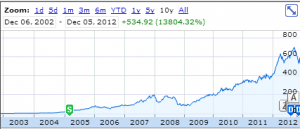The Economist ran an article title “The PC All Over Again” that talked about the potential backlash 3D printers will see from traditional manufacturers. Specifically the sub title mentioned “toy makers” which peeked my interest since that is the day job. Many of the comments point out that for many products it will be a while before home 3D printers can economically recreate mass produced products. Though I tend to agree with the comments I do see the writer’s point that some clarifications on IP will be required to further additive manufacturing at a consumer level. That’s not to say I believe most manufacturers will fight progress, it would be wrong for them to do so. From the article:
Michael Weinberg of Public Knowledge, an advocacy group in Washington, DC, fears that the fledgling technology could have its wings clipped by traditional manufacturers who see it as a threat to their livelihoods. Because a 3D printer can make perfect replicas of many kinds of object, manufacturers may seek to brand it a “piracy machine” and demand additional measures to protect their traditional way of doing business. Mr Weinberg worries that they may behave rather like the record industry did when its own business model—based on selling pricey CD albums that few music fans wanted, instead of cheap single tracks they craved—came under attack from Napster and other file-swapping networks.
Sure, some companies are bound to fight to protect ideas and property that they have created. They are right to do so, but demanding protecting of an existing way of business has not proved fruitful in the past. Just ask any record company how that worked out for them. Then go take a look at the results of another approach. Here’s a graph of the stock price of a company that decided to embrace the new developments in music and leverage technology to create an entirely new revenue stream.
Looks pretty nice. It’s a little unfair to pull in Apple’s performance since they have so many other products, but no one can deny that iTunes has helped to drive growth since debuting in Jan 2001. Other companies, such as Spotify and Rhapsody, have picked up where record companies left off by developing new offerings independent of old business models. Additionally the rise of easy distribution allowed many creators to capture some success. From new acts Justin Beiber, who broke through via hit YouTube videos, to established bands like Radiohead, the first major act to dabble with a “pay-what-you-want” self publishing model, many have benefited from the new developments in technology.
Most likely there are entire products lines that have yet to be dreamed up for this new manufacturing technique, 3D Printing. To liken things back to the music analogy, think of podcasts. Weekly live recordings or topical information would have been completely useless prior to iTunes and other distribution methods. There are ample opportunities for innovative companies to grab hold of 3D printing and develop products that utilize the benefits of 3D printing to satisfy the needs and demands of consumers. As a toy maker I am not preparing to fight back the advances in technology. Instead I am eager to see even more new developments and take on the challenge of innovative in a space that is still undefined.
Read more on the developments in 3D Printing

